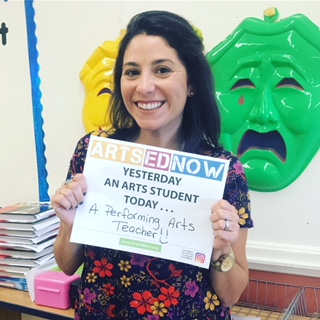Getting Parents and Caregivers on Board with Arts Ed
Every September curious parents gather in my classroom and wonder what exactly “drama class” means. Wondering and thinking, my child is certainly dramatic enough, why on Earth would he or she need drama? How can this possibly benefit my child? What are its uses? Parents and caregivers often have a limited scope about what drama and theater means. Being an arts advocate means informing all stakeholders about specific reasons their child needs to take these classes.
To proactively address this mindset, last year I started giving out material from Arts Ed Now at any opportunity I could seize. I advocated at after-school events, concerts and Back-to-School night, just to name a few. Social media is the first virtual platform I created. Through social media pages, I was able to get 500 parents and caregivers to like the page. Through that page I would talk about projects we were doing, give them stats, share community info and basically get them to see exactly what we were doing and why. I took pictures of students and district administrators holding up posters saying, “Today an Arts Student…” and “Yesterday an Arts Student…” This had a huge response from community stakeholders because I think families often fear that participation in the arts is just a means of distraction from another career. What I try to help families understand is that this notion is the exact opposite. Participation in theater, music or visual art will not hinder a student from entering a career that isn’t necessarily rooted in the arts. It actually helps!
I found that if I could engage parents face to face and virtually, I could get them on board with why Arts Ed is essential to their child’s education. I explained and gave examples of what arts classes do for educating the “whole child.” We often forget that in education. We talk so much about bullying and violence in our schools, but if we aren’t teaching these kids empathy, self -expression, and confidence, than who is? This generation today is a tech-savvy generation. Gone are the days of playing outside until the street lights come on. Intrapersonal skills must be taught in some manner. Of course, math, language arts and science are vital to a child’s education but so are self-worth and general well-being. The arts teach this. The arts teach creativity and critical thinking needed today in our complex world. This is what I stress to my parents. I take the opportunity during these school functions to get the message across that this is important and here’s why. You will hear me out, because I am coming to you face to face. I present them with the colorful stickers, stat sheets, and posters. I show them. I tell them.
It is unfortunate that we must fight for our art, but what artist hasn’t had to fight in the eons of art history and performance. Now, more than ever, we must show that we are an integral part of the whole child. We are a necessary part of their education. We are not extracurricular. This is not just for fun. The arts are not a carrot to be held over their heads. We must fight to take our place as a piece of the equation that truly makes a child whole.
I urge all my fellow arts colleagues to share this information with families. Please help me to help them understand why we must cultivate a lifelong love for the arts and Arts Ed Now.

